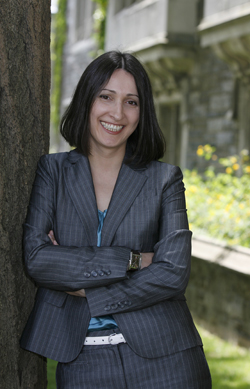Tackling tough questions as a judge leads Temple grad to dig deeper
Doctor of philosophy: criminal justice
 Photo by
Joseph V. Labolito/Temple University Elena Rely Vîlcica
|
At the time of Elena Rely Vîlcica’s decision to attend graduate school, she was already well on her way to a very successful judicial career in Romania. Having graduated at the top of her class from the National Institute of Magistrature (designed specifically for the preparation of selected attendees for future judgeships), she was given the highly coveted opportunity to choose the court where she wanted to begin her tenured position as a judge. She chose Bucharest, Romania’s capital. But, addressing criminal cases in the largest urban jurisdiction in Romania raised questions — and the answers, Vîlcica discovered, were not easily found in her law books. She recalls one case, for example, which called for a mandatory minimum sentence of seven years for petty theft. The defendant was a repeat offender who, bycommitting this offense, violated the probation he received for a previous similar offense. “The case raised questions for me not only about the reasons he committed the crime – assuming he was aware of the potential consequences of his probation violation – but also about the soundness of a law calling for mandatory penalties without room for consideration of individual case aspects,” Vîlcica explained. |
|
As a judge, Vîlcica confronted critical issues like these every day – issues involving the social and environmental conditions that lead people to commit crime, the justice system’s responses and solutions to crime, and the human rights concerns emerging from the newly forming democracy in Romania, which at the time was in the process of joining the European Union. Her experiences on the bench and the challenges and questions she faced there strengthened her intellectual commitment and her desire to pursue graduate studies in criminal justice in an international environment. According to Vîlcica, her reasons for choosing Temple were simple. “The prospect of working with Temple’s internationally recognized scholars, in a very challenging research environment, nested in one of the largest and most vibrant urban settings in America, and among a very diverse student population, is perhaps the shortest way of describing my reasons for my decision to pursue my Ph.D. in criminal justice at Temple,” Vîlcica explained. She is also grateful to Temple for awarding her a Presidential Fellowship to complete her doctoral work. Since arriving at Temple, Vîlcica has regularly presented research at the American Society of Criminology, and has represented Temple as well at international conferences, such as the 14th World Congress in Criminology. For her dissertation, titled “The Public Safety Dimensions and Implications of Dismissal: The Unexamined Criminal Case Disposition,” she explored the relationship between case dismissal and public safety in two ways: whether consideration of public safety risk factors influence the dismissal decision, and whether dismissal in itself increases the likelihood of a defendant committing a subsequent crime. Vîlcica has accepted an invitation to stay at Temple next year as a visiting assistant professor. |
|